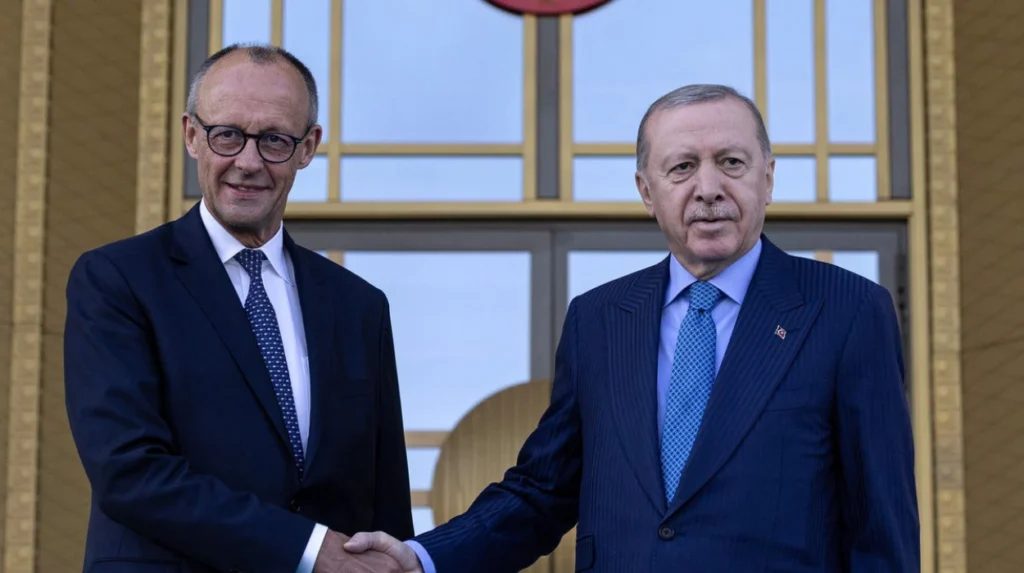Despite ongoing tensions surrounding the Gaza conflict and concerns about Turkey’s human rights record, German Chancellor Friedrich Merz has reaffirmed his support for Turkey’s bid to join the European Union. His stance comes amid a backdrop of political complexities involving Ankara’s stalled accession process and strained relations between Turkey and several EU members. Merz’s position signals a pragmatic approach that balances Turkey’s strategic importance against persistent questions about its democratic adherence and foreign policy divergences. This article examines the current status of Turkey’s EU accession, Merz’s statements, and the broader geopolitical challenges shaping Turkey-EU relations in 2025.
Turkey’s EU Accession Status: A Frozen Negotiation
Turkey’s efforts to join the EU officially began in 1987, but the negotiation process stalled several years ago. Since 2018, accession talks have effectively been frozen due to multiple factors. The European Parliament reaffirmed this freeze in a report passed in May 2025, highlighting concerns over Turkey’s democratic backsliding, worsening human rights conditions, and failures to align with EU political values. Despite retaining candidate status on paper, the report concluded that “there is no progress” in accession negotiations, fundamentally due to erosion in democratic governance evidenced by events such as the crackdown on anti-government demonstrations and the politically motivated detentions, including the high-profile arrest of Istanbul Mayor Ekrem İmamoğlu.
The EU’s concerns are deeply rooted in Turkey’s recent shifts toward an authoritarian model, which contradicts membership criteria emphasizing stable institutions, democracy, rule of law, respect for minorities, and good neighborly relations. The rapporteur Nacho Sánchez Amor stated plainly,
“The further they push towards a full authoritarian model, the further they move away from EU membership.”
This assessment sets a stark tone for the current impasse, underscoring that political reforms are crucial for any possibility of renewed accession progress.
Merz’s Support Amidst Political Strains
In this complicated environment, Friedrich Merz, Germany’s Chancellor, surprised many by publicly backing Turkey’s EU bid despite the strained context. His emphasis is on Turkey’s strategic importance to Europe more broadly, beyond the immediate political disagreements. Germany views Turkey as a critical partner in areas such as migration management, security cooperation, and regional stability—particularly in light of ongoing challenges in the Middle East and the eastern Mediterranean.
Merz articulated a pragmatic stance, emphasizing the need to separate political disagreements from the broader strategic imperative of maintaining strong ties with Turkey. He highlighted that Turkey plays a key role in managing migration flows affecting Europe and serves as a vital NATO ally with extensive security cooperation. Merz argued that
“While we must address concerns related to human rights and foreign policy, Turkey’s partnership remains indispensable for European stability and security.”
The chancellor’s position reflects a balancing act: he supports political dialogue to push Turkey toward reforms but resists completely isolating Ankara given its geopolitical significance. This approach contrasts with harder stances from some EU member states that have repeatedly called for a complete suspension of Turkey’s accession prospects until democratic and human rights developments improve.
Human Rights Concerns and Geopolitical Challenges
The ongoing conflict in Gaza has introduced fresh strains in Turkey-EU relations. Ankara’s vocal criticism of Israel’s military actions and its support for Palestinian causes have clashed with views held by multiple EU capitals, complicating diplomatic coordination. Nonetheless, Merz’s comments suggest a willingness to engage Turkey constructively despite these tensions.
Turkey’s domestic human rights record remains a central issue in its EU negotiations. The European Parliament and various human rights watchdogs emphasize concerns about suppression of media freedom, harassment of opposition politicians, imprisonment of dissidents, and violations of minority rights. These issues continue to weigh heavily on the EU’s approach, creating a fundamental dilemma: how to reconcile Turkey’s strategic value with its democratic shortcomings.
Various political groups within the EU also remain divided on Turkey’s accession, with more skeptical voices highlighting Turkey’s authoritarian trends as incompatible with EU values. Meanwhile, supporters argue that Turkey’s reform path can only be encouraged through engagement rather than punitive isolation.
Turkey’s Role in Regional Security
Turkey’s unique position as a linchpin in Euro-Atlantic security architecture is undeniable. It has the largest standing army in the region, a growing defense industry, and plays a pivotal role in NATO’s southern flank. This military and strategic profile enhances Turkey’s leverage and relevance in EU security discussions, especially given the volatile dynamics in Syria, Iraq, and the eastern Mediterranean.
The EU recognizes Turkey’s indispensable role in addressing shared concerns such as counter-terrorism, migration control, and regional diplomacy. This pragmatic dimension is crucial to understanding Merz’s supportive stance on Turkey’s EU candidacy, despite unresolved political frictions.
Future Prospects: Muddling Through
Given the entrenched political challenges, the most likely scenario is a continuation of the current frozen status. Turkey’s accession process will remain suspended, with no new chapters opening or closing, while both sides engage selectively on areas of mutual interest. This “muddling through” approach maintains diplomatic channels and cooperation without meaningful progress toward EU membership.
While an unlikely scenario involves a comprehensive revival of accession talks tied to extensive reforms and geopolitical cooperation, such an outcome depends on Turkey’s willingness to restore democratic norms and resolve key disputes, including those with Greece and Cyprus. Opposition from some key EU states, notably France and Germany, complicates any swift advancement.
Chancellor Friedrich Merz’s endorsement of Turkey’s EU bid amid ongoing tensions highlights the intricate balancing act facing Europe today. Turkey’s strategic importance for security and migration management is weighed against serious concerns over its democratic backsliding and contentious foreign policy positions, including over Gaza.
The frozen accession process marks a stalemate shaped by conflicting priorities between principle and pragmatism. While prospects for full EU membership remain distant unless Turkey embarks on significant political reforms, Merz’s stance illustrates a preference for engagement and dialogue to maintain strategic partnerships.







